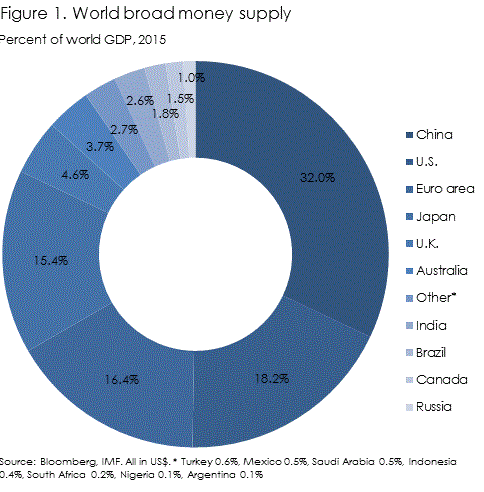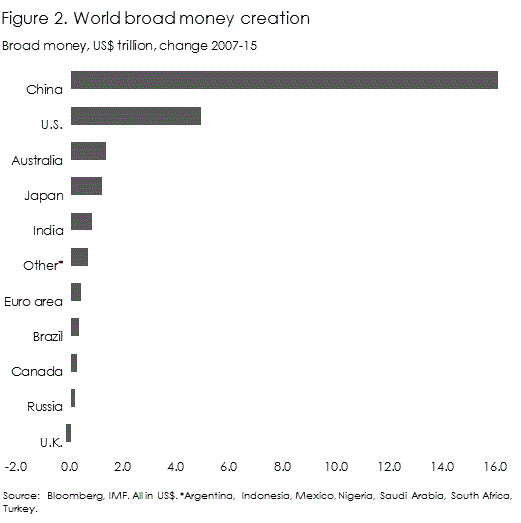The Chinese money wall (update)
6 October 2016
The inclusion of the renminbi in the IMF’s SDR basket on 1 October signifies that China will have to maintain progress towards financial liberalisation to sustain the new reserve currency status of the renminbi. China’s massive stock of money may represent its biggest obstacle to pursue orderly liberalisation both domestic and international. The persistent significant expansion of China’s money supply serves as a reminder that the monetary dimension of China’s rise may be one of the most important factors in determining prospects of China’s international integration.
China’s trend of significant monetary expansion has been maintained (see, The Chinese money wall). Between 2013 and 2015, China created more than twice the amount of broad money than the U.S.
In 2015, China represented about one third of the world’s broad money supply and contributed more than three fifth to total broad money growth between 2007 and 2015 becoming the main source by far of broad money creation. Between 2007 and 2015, China increased its broad money supply almost three-fold. In 2015, China represented 32.0 percent the world’s money supply or 29.6 percent of world GDP. Of the US$25.6 trillion in additional money supply created between 2007 and 2015, China represented US$16.1 trillion or 63 percent.
China’s broad money to GDP has increased from 151 percent of GDP in 2007, to 190 percent in 2013 and 206 percent in 2015. The large stock of money and rapid rise is a reflection of important financial savings, financial deepening and the central role of the banking system. Japan still had the highest broad money to GDP of any major economy at 251 percent in 2015 compared with 69 percent of GDP for the U.S., 99 percent for the Euro Area and 114 percent for the U.K.
The large stock and especially expansion of China’s broad money supply implies various challenges. Domestically, the rapid rise has funded the biggest and fastest growing banking sector in the world and its rapid expansion must give rise to concerns about asset quality. Internationally, while only a small portion of the money is likely to seek leaving China, given the scale its impact would be felt considerably in international markets; any important leakages would represent a major shock.
China’s commitment to financial liberalisation matters for the international economy. The pace of liberalisation, accompanying measures and modalities (see The Chinese money wall) though will likely have a huge impact on the rest of the world. The integration of China into the world’s real economy may be dwarfed by its integration into the financial economy. The renminbi’s reserve currency status now implies that there is no turning back.

